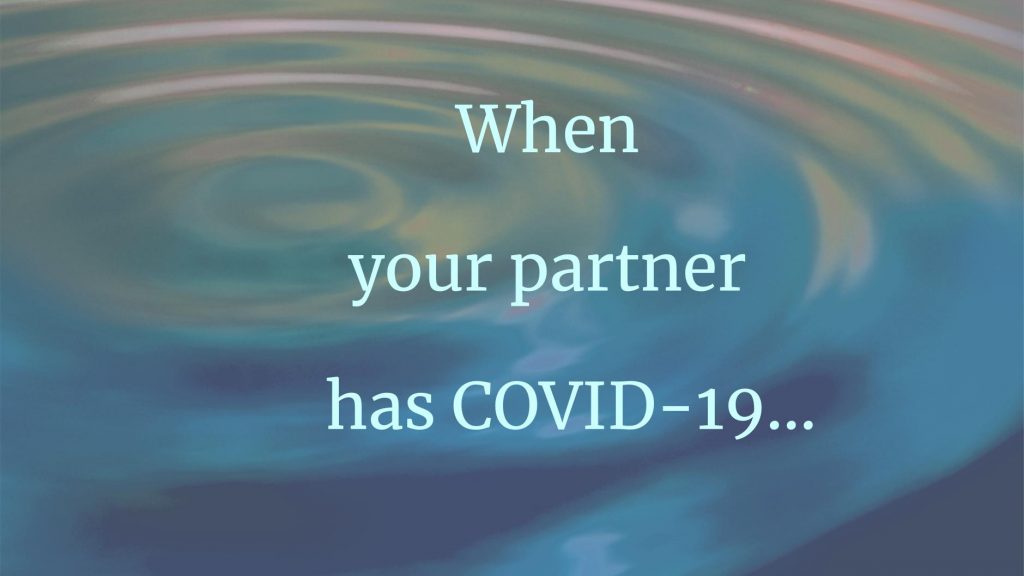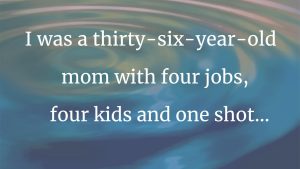COVID-19 Confinement, Day Four: My partner, James, sleeps. He coughs. He breathes. He smiled this morning when I brought in tea. He nodded when I asked if he wanted the curtains open so that he could look at the sea, then returned to sleep.
We’re quarantined in James’s new beach house on a skinny peninsula that’s only three blocks wide, bay-to-sea, off of New Jersey. I am a stranger here. When a cardiologist covering for James’s doctor in New York asked me the location of the nearest hospital, I couldn’t say.
I’m sitting in the second bedroom on a small orange settee. Hard and spare, it provides the structure on which I wait as we make our way through the long days–James in one room, I in the next, close enough to respond if need be.
We haven’t even finished furnishing this place. This room has no bedside table or lamp. There is an electrical short inside the wall next to my bed. If I bump it, the ceiling light blows out.
I’m sure that James has COVID-19. At first, he denied this. His cough was an allergy; his deep fatigue, simple weariness; his low-grade fever, my imagination. When I voiced my suspicions, he rolled his eyes. Losing his sense of taste finally convinced him.
Well-meaning friends and one doctor have asked how he got it. The short answer is, “We live in New York City.” Right now, it doesn’t matter in the least.
James has what is likely a moderate case–cough, no interest in food, a profound need for sleep. Still, it is shocking when a six-foot three-inch, 225-pound man goes down. He is one generous, smart, energetic human being, a force of nature when not ill. Beloved by human and canine alike, he’s saved the lives of five pedestrians over half as many years by putting out his arm to block a distracted, ill-timed tumble into the street.
Now the virus is cascading through his body. It has taken over his cells’ functions, just as governments transformed mills, mines and factories during World War II to produce munitions. Only instead of fighting evil, the virus is turning his body against itself.
To avoid infection, I’m supposed to leave his food and drink by the door, but he can’t get out of bed. So I cover my face with a rag or hold my breath and carry in orange juice, Pedialyte, water, tea, milkshakes. He turns away.
“How can I keep him hydrated?” I ask the doctor.
“Just one bite of food and a few swallows of liquid a day are enough,” she says.
Should I fall ill, neither of us would survive: His family will never forgive me if I let him die. Mine will never forgive me if I get sick.
An old friend says, “Attending him is too great a risk. Leave.” But I cannot abandon the man I’m in love with.
Five years ago, when my husband of thirty years died after a long illness, I moved back to New York from Michigan. I’d lived in a delightful town, but I couldn’t bear another winter of shoveling the driveway. I couldn’t bear living alone in a four-bedroom house. I couldn’t bear that my children were so far from me.
James and I have been together for three years. A few months into our relationship, I told him, “Perhaps you had better cut and run.” He thought I was kidding. “You shouldn’t trust me; I lost the last one,” I blurted, tears streaming.
I can’t let the same thing happen this time. I can’t afford exhaustion or panic.
Keep alert, I tell myself. Keep still. Keep moving.
Day Seven: He breathes more easily. He coughs less. He still doesn’t eat, but is awake today from morning till evening.
I’ve read that between days five and eight, patients who turn the corner sometimes suddenly decline. I must remain vigilant.
I speak with my children in Brooklyn twice a day. I speak to four doctors over eight days. One says that James should get tested; three others say the virus is best left to run its course at home, as long as his breathing doesn’t grow labored.
Like most people, I’m paralyzed–not because the virus resides within my cells but because I dwell within the prison-like conditions it’s created. We are all in a holding cell, regarded with suspicion, in or out of our houses. Those of us who like to be alone feel no less bereft than those who live to connect.
I need a walk. When we left the city, I grabbed a jacket instead of a coat. The boardwalk here is windy, and so on walks I’ve been freezing. But that’s no longer relevant. Yesterday when I set out, a policeman shouted that the beach and boardwalk are now closed.
Day Ten: This morning, James asks for pancakes.
“We have fifteen pounds of mix downstairs,” he reminds me. It’s part of the supplies he laid in at the beach house in case any of our five kids and their partners sought refuge with us. When the heavy box arrived, I wanted to scream, but resisted because I myself had bought extra laundry soap, dish detergent and zinc. I hate mixes, but nonetheless use this one to whip up some pancakes, because he’s been starving. He takes one bite. I think they’re divine and almost finish the rest–the first substantial meal I’ve had in a week.
I clasp my cell phone to my breast. I love it for the invisible wires that moor me to family, friends, art, news and politics. I love it for the ways it’s connected me to doctors while James has been ill, while I am alone in an unfamiliar place. Right now the house and town feel tainted, but I make a bargain with myself: If he gets well, I shall grow to love this place.
Day Twelve: He spends the day sitting in a chair and eats eggs, muffins, soup, risotto and two smoothies.
We are so lucky.
About the author:
Jill Siebers writes, cooks and has often combined the two. A pastry chef, she has also been a jewelry designer and college administrator and has had works published in Poetica, The Examined Life, Switched-on Gutenberg and Ouen Press: Taste. She works with homeless youth and on the reading skills of New York City schoolchildren. “I’ve written since I was seven. My parents didn’t appreciate childhood; I wasn’t allowed to watch TV, and discovered words. I didn’t need my parents’ permission to read or write.”









17 thoughts on “Doing Time”
You’ve painted such a moving picture with your words and it made me pause and be even more thankful for the safety and health of my family and loved ones. So glad that James continues to recover, hope that you both continue to share many more years of love together. Miss you lots!
Thank you for loving my brother enough to do what you did for him!
Oh Jill , so sorry to hear of your experience with the virus. So glad James is hopefully in the road to recovery. You write so eloquently ( of course you do). Thanks Claire for sharing this. Xoxo.
I’m glad that James is healing. Stay safe.
I have gained new-found respect in the restorative power of pancakes! Well done, Jill, in keeping both of yourselves alive during these dire days.
So authentic in its vulnerability. A testament to love during these challenging times. Bless you Jill. Love to you both. Deb
A beautiful story of devotion, movingly written.
It is so important to have a record of the personal impact of this global devastation. Thank you, Jill.
Welcome home, James.
Yes, you are both so lucky – in each other.
Jill , that was beautiful you don’t know how much we appreciate what you did for son.Words cannot describe how much we think of you .
Thank you for sharing your story. Such a difficult situation.
I’m so glad that James is improving, and that you are OK.
Jill, so moving. Tried to get in touch with you when all this started. Sending much love
Thanks for sending this, Jill! I’m so glad that James is recovering and that you write so beautifully!
Beautifully written, very touching. Life in our new reality.
Good story, well told.
Thanks for sharing your story and your skillful writing.
I was touched by the honesty and depth of this description of the emotional struggle we are all dealing with, and moved by her courage to share it. So glad James pulled through.
What a story! What inner stamina, courage and love! Thanks for sharing this,
thank you for sharing this touching story. I’m so glad James improved .May you spend many happy days in the lovely beach house together